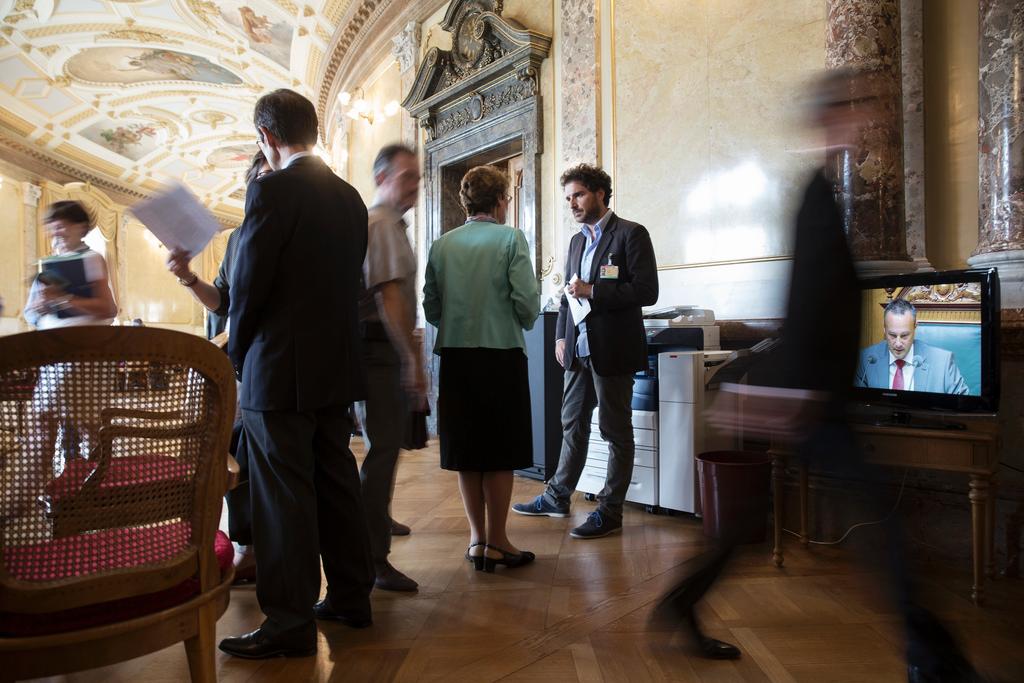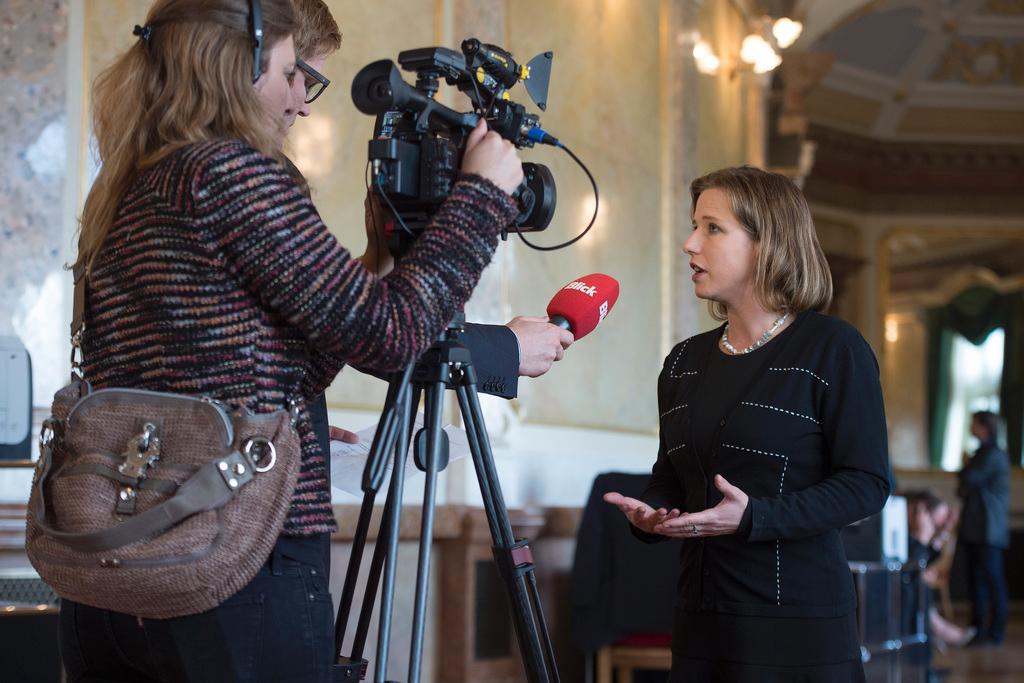Politicians move against ‘hired guns’ in parliament

Lobbying has become a growth industry in the halls of Switzerland’s parliament. Its scope and complexity are even opening the door to foreign influence. The lack of transparency is spurring politicians to impose some rules, after years of foot-dragging on the issue.
University of Lausanne political scientist André Mach is co-leader of a comparative study of the strategies used by lobby groups in Switzerland and California. The findings of the study have yet to be published, but Mach is sure of one thing: lobbying in Swiss parliament has increased in scope and sophistication over the past 20 years.
This emerges clearly from a detailed analysis of the lists of accredited ‘guests’ of parliamentarians and the official registers in which all elected members have to disclose their vested interests. The study has revealed a continual growth in the interests of parliamentarians, which often take the form of leadership roles in organisations and companies.
“These vested interests are focused on the legislative committees,” Mach points out. This means that interest groups and large corporations like to appoint to their boards and executives “parliamentarians who are members of the legislative committees that deal specifically with their field of activity, for example health, transport and communications, energy or private-sector business.”
According to Mach, “it is something of a paradox”, since this development has been paralleled by “a certain professionalisation of the Swiss parliament.” Increases in income and the creation of specialised legislative committees were supposed to allow parliamentarians to be more independent financially as they develop expertise on the issues.
Where decisions made
The increase in lobbying within parliament is explained by a shift of emphasis attested by another study: the decline in influence of interest groups – such as trade associations – compared with political parties, and the decline in importance of the pre-parliamentary stage of the decision-making process as compared to the parliamentary stage.
“In the 1970s the Swiss parliament was a kind of official registry which just rubber-stamped the solutions agreed upon in the pre-parliamentary stage between the public service, government and interest groups,” recalls Pascal Sciarini, co-author of the study and a professor of political science at the University of Geneva.
Today, however, it is mostly in parliament that majorities are built for making decisions. “So the influencing work of lobbyists has moved to the parliamentary stage.”
Shadowy world
“Whereas up until 20 years ago it was very clear who was bringing pressure to bear and what interests they represented, now we are faced with fundamental change: lobbying has become a real profession, and lobbyists work for several clients, without it being clear who these are and how many of them there are. This is affecting the whole Swiss political system, not just parliament,” points out Claude Longchamp, director of the research institute gfs.bern.
He adds: “This is how you open the door to foreign influence in Switzerland.” The spectre of foreign influence was highlighted by the recent Kazakhstan affair.
People who work for public relations and communications firms or as private consultants, and “who are seen pretty much as ‘hired guns’, are the most recent lobbying phenomenon”, says Mach. This shadowy world of lobbying has become quite pervasive. “All the major public relations firms have their representatives among the ‘guests’ of parliamentarians,” he says.
Renewed efforts for change
While the majority of those in parliament have always been unwilling to impose clear rules that would make these activities transparent, the situation may change in the wake of the well-publicised “Kazakhstan affair” involving centre-right Radical parliamentarian Christa Markwalder, which revealed the extent of this lobbying and the traps for the unwary which it involves.
In early May the Neue Zürcher Zeitung revealed that in 2013 Radical member Christa Markwalder tabled a parliamentary question on relations between Switzerland and Kazakhstan, which had not been written by herself but by a lobbyist working for a public relations firm hired by the Ak-Jol party in the central Asian country. This political group calls itself an opposition party, whereas in fact it is close to the Kazakh regime. Unknown to Markwalder, the text drafted by the lobbyist was in fact rewritten by Kazakh government officials. It later emerged that Markwalder had given the lobbyist documents received at a committee hearing and thus appeared to have violated parliamentary confidentiality.
The renewal of discussion on lobbying in the wake of these revelations has provided fresh encouragement to those parliamentarians from various parties who have previously put forward proposals on transparency for lobbyists, but without success.
Lukas Reimann of the conservative right Swiss People’s Party has put down a motion in which he calls for the introduction of a compulsory register for lobbyists with access to the federal chambers, in which it would be stated who they are working for, who pays them, what methods they use and who the object of their lobbying is. And as already happens with journalists, lobbyists would be accredited not by parliamentarians individually, but by the central administration of parliament.
Social Democrat senator Didier Berberat also thinks the wind has changed direction and that a new parliamentary initiative of his is now likely to succeed.
Andrea Caroni is thinking the same way, yet the Radical member is re-tabling just one of the proposals contained in his original parliamentary initiative which failed to win approval in 2014: the requirement that lobbyists indicate not just the public relations firm they are working for, but also all the clients they represent in the halls of parliament. Caroni believes it is not yet time to get a majority to change the system completely.
The people as last recourse
Even more pessimistic about parliament’s willingness to change is senator Thomas Minder, who four years ago called for a total ban on lobbyists in the two federal chambers. “I think the solution for this problem can only come from outside – I mean from the people. I have already held consultations to launch a people’s initiative. It will take time, but I will keep it as one my priorities,” says the crusading independent senator.
Minder intends to go further: he wants to forbid members of the senate to take on work from interest groups and large corporations. “Transparency is not enough,” he says, “because being a part-time parliamentarian [as Swiss politicians are expected to be] means having a job besides your parliamentary mandate. But it doesn’t mean that you go around collecting jobs. I think the people would agree.”
Any member of either of the federal chambers can designate two people who have the right to attend parliamentary sittings as his or her guests. They have to be entered on a list which is available for public inspection. These guests may be representatives of interest groups, who thus get the opportunity to lobby inside the halls of parliament. Those accredited are not obliged to declare their business. Thus there are lobbyists on the accreditation lists of the two houses of parliament who are identified just as ‘guests’ or ‘personal assistants’. On the other hand, there are more and more professional lobbyists who state the public relations company they work for – but the actual clients they are representing remain unknown. Parliamentarians can also issue complimentary tickets for access to the federal building for a day, and recipients of these are on no public list.
Translated from Italian by Terence MacNamee

In compliance with the JTI standards
More: SWI swissinfo.ch certified by the Journalism Trust Initiative














You can find an overview of ongoing debates with our journalists here . Please join us!
If you want to start a conversation about a topic raised in this article or want to report factual errors, email us at english@swissinfo.ch.